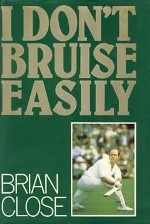I Don’t Bruise Easily
David Taylor |Published: 1978
Pages: 253
Author: Close, Brian
Publisher: McDonald & Janes
Rating: 3 stars

Picking a theme team is often a fun exercise. For my follically Challenged XI I’d have Geoff Boycott to open, Bill O’Reilly and Vintcent Van Der Bijl in the attack and Clive Rice in the middle order. And who better to captain the side than Dennis Brian Close, Yorkshire and England, 1949 to 1977 (and captain of his own side for years after that).
Close’s career was certainly worthy of a book, though whether he should have written it is open to question. A fearless left-handed batsman and short-leg fielder, attacking captain, and distinctly useful bowler of medium pace and off-spin, he could have been a fixture in England sides for two decades. Instead he managed just 22 caps between 1949 and 1976, somehow contriving to be England’s youngest Test player (at 18, in his debut season) and one of their oldest, as he bravely faced up to Holding and co at Manchester at 45. With a top score of only 70 there is no doubt that he under-achieved, but he was messed around by selectors as well, as he tells us on a regular basis, rarely given more than a couple of matches to establish himself.
Close begins his account with that 1976 Old Trafford Test and then goes back to the beginning – picked for Yorkshire and England while doing his national service, doing the “double” in that debut season, then an unhappy tour of Australia under Freddie Brown when, he claims, he was ordered to play while injured (acting captain Denis Compton tearing up a doctor’s letter). He is dismissive of Surrey’s seven Championships of the 1950s, claiming that much of their success was due to the Oval wickets, but has plenty to say about the almost as successful Yorkshire side of the mid-1960s, and has interesting insights on the likes of Boycott and Ray Illingworth. He is as unapologetic as you would expect on the Incident at Edgbaston (his chapter heading) when Warwickshire were denied what looked a likely win – an episode which lead directly to the requirement to bowl 20 overs in the last hour – pointing out that Colin Cowdrey, his replacement as England captain, did exactly the same shortly afterwards in a Test in the West Indies.
Books written by people with an axe to grind can make unedifying reading. What the writer intends as “putting the record straight” can often come across merely as whinging or score-settling. Boycott’s autobiography published a decade later is a similar exercise in self-justification – it seems that few can nurture a grudge for as long and as effectively as a Yorkshireman. That said, if everything Close relates here happened the way he said it (and the tale of his being told to open in that final series because the management didn’t want Bob Woolmer to risk injury has been confirmed in other accounts) he has good reason to feel aggrieved. But his book is not devoid of humour (a shot that ricocheted off his head went far enough for the batsmen to run three – “but I bowled the next over from the other end!”) and it is always an entertaining read, from one of English cricket’s great characters.






Leave a comment